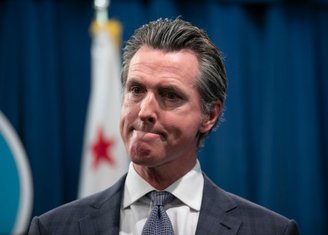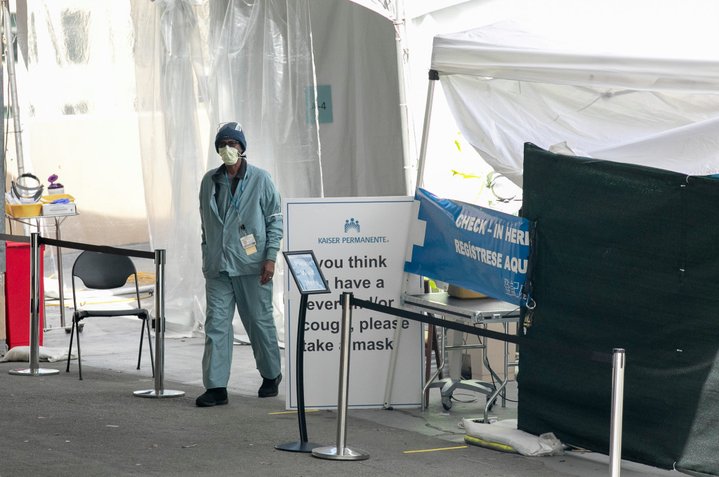Gov. Gavin Newsom is facing intense lobbying from both business and labor as he weighs an executive order that would make it easier for essential workers such as nurses and grocery clerks to get workers’ compensation if they contract COVID-19.
His dilemma: whether to issue an order creating a legal presumption that essential employees were infected with the novel coronavirus at work, rather than in the community — making it easier for them to qualify for benefits. State lawmakers also have introduced two bills that would accomplish something similar, but the legislative proposals differ in their approaches and how many workers would be covered.
California officials and employers are gearing up for a wave of workers’ compensation claims that could top $33 billion as the state’s COVID-19 cases surpass 42,000 and millions of essential workers remain on the job — and at risk.
Already the state had received 1,527 COVID-related claims by April 16, according to a spokesman for California’s Department of Industrial Relations, which oversees workers’ compensation cases.

Gov. Gavin Newsom at a press conference in the state capitol following the first COVID-19 death in California. Photo by Anne Wernikoff for CalMatters.
Both the California and U.S. Chambers of Commerce have urged Newsom to restrict any executive order to only some essential workers because their claims could cost employers and insurers billions of dollars. Unions want Newsom to include as many workers as possible because they often are required to work with inadequate protective gear and access to testing.
A spokesman for the governor did not respond to request questions about a potential executive order or which workers it might cover.
Workers’ compensation benefits include health care that’s not subject to copays or dollar limits, medications, disability payments to partially replace wages and, in the worst case, death and burial benefits for families.
But workers often find it tough to qualify for workers’ comp: Currently, those who fall ill on the job must prove they contracted the disease specifically because of their work, with some exceptions for first responders. And employers can contest their claims.
The State Compensation Insurance Fund, California’s largest individual workers’ compensation insurer with nearly 11 percent of market share, recently lifted that proof requirement for COVID-infected essential workers, but only workers whose employers are insured by the fund will benefit. Some hospital systems, including Sutter Health, have said they will presume front-line workers contracted the disease at work.
“A ridiculous burden on people protecting us”
Ramona Moll, an emergency room nurse at the UC-Davis hospital in Sacramento, can pinpoint the day in March she believes she was infected with COVID-19: Wearing only a surgical mask, she tried to help a combative elderly patient who was struggling to breathe. She was hospitalized for shortness of breath several days later. Moll was too sick to work for 28 days, and even now can’t return to work until she has three negative tests for the virus, she told CalMatters.
Moll said she was fortunate her hospital gave her paid leave while she couldn’t work, but she’s considering applying for workers’ compensation. Her daughter, who works in human resources, urged her to do so. She said she would welcome any state action that would make it easier to file a claim.
“Nobody knows enough about this virus to know if there’s going to be residual issues. With this virus, it is very difficult to nail down the exact moment of exposure,” said Moll, 48, of Elk Grove. “We have all these (patient privacy) rules preventing us from going back and retracing our steps. We’re not sitting there and considering our mortality; we’re taking care of patients — which works against us, when we’re trying to recreate what happened.”
San Mateo workers’ compensation attorney Gregory Cattermole said workers shouldn’t have to worry about whether their employers will fight their claims for benefits.
“I don’t think it’s fair or reasonable that our front-line workers have to bear the burden to prove where it came from,” Cattermole said. “That’s a ridiculous burden to put on people who are really protecting us and keeping the state healthy.”
But the potential costs for workers’ comp insurers — and the employers who must pay for that insurance — are daunting. A recent analysis from the Workers’ Compensation Insurance Rating Bureau of California estimates that the cost of COVID-19 claims for California workers deemed essential during the pandemic could range from $2.2 billion to $33.6 billion annually. A mid-range estimate of $11.2 billion would comprise more than 60% of all California workers’ comp annual claims before the pandemic.

A health care worker masked against COVID-19 exposure at the check-in area at a Kaiser emergency room in San Francisco on April 9. A potential governor’s executive order and pending legislation would make it easier for such workers to qualify for workers’ comp benefits if they contract the illness. Photo by Anne Wernikoff for CalMatters.
Those costs have pitted organized labor against industry groups in California and nationwide as states grapple with claims that could overwhelm their workers’ compensation systems.
Connecticut Governor Ned Lamont is considering an executive order that would extend presumptive eligibility to essential workers who contract COVID-19; a New Jersey state senator has introduced similar legislation. Florida will cover state workers’ COVID comp claims, and Kansas will grant the same protection to first responders.
A clause in Wisconsin’s pandemic relief legislation, however, would require first responders to identify what call they were infected on, something firefighters and paramedics vociferously oppose. And in Illinois, a judge recently blocked a state rule that essential workers would be presumed to have gotten infected on the job, even if they worked remotely, after business leaders sued over the change.
“The private sector cannot be the safety net”
In California, labor groups asked the governor to issue an executive order quickly to protect workers, while business lobbying groups are marshaling their forces in potential opposition — as soon as they know exactly what they need to oppose.
“Workers on the frontlines of the COVID-19 pandemic put their lives at risk just doing their jobs,” the California Labor Federation’s leader Art Pulaski wrote in a letter to the governor that requested additional worker protections including more protective gear. “If they are infected with COVID-19, the workers’ compensation system must quickly provide medical and indemnity benefits — such workers should not have to fight denials and delays while fighting for their lives.”
The California Chamber of Commerce relayed its concerns to the governor about “an overly broad executive order because it would create an enormous and unnecessary burden on the worker’s compensation system. Imposing a legal conclusion that any employee who contracts the coronavirus is covered by worker’s compensation benefits, shifts the cost of this pandemic to the private sector,” spokeswoman Denise Davis said in an email. “As we have previously stated, the private sector cannot be the safety net for this crisis, that is the role of government.”
The U.S. Chamber of Commerce, fearing that other states may follow California’s actions, also asked Newsom to avoid covering all essential workers because of the costs.
The Workers’ Compensation Insurance Rating Bureau has scrapped a recommended rate increase for employers for this year and petitioned California Insurance Commissioner Ricardo Lara to approve new regulations that would keep employers’ workers’ comp insurance premiums from rising if their workers file COVID-19 claims. Non-COVID workers compensation claims are likely to decrease with so many fewer people in workplaces during the shelter-in-place order, which may also help keep employers’ rates stable.
State lawmakers also will consider two very different bills, both in committee, that would extend workers’ comp protections to essential workers.
AB 664 is sponsored by the California Nurses Association and introduced by Democratic Assemblymembers Jim Cooper of Elk Grove and Lorena Gonzalez of San Diego. It would grant “presumptive eligibility” to front-line health workers and first responders such as police and firefighters if they contract COVID-19 or any other infectious disease — but only if the state or local government has declared a state of emergency.
A second proposal, SB 1159 by Democratic Sen. Jerry Hill of San Mateo, would apply to a larger group of essential workers, but cover only COVID-19 and would continue to allow employers to contest whether an employee actually contracted the infection at work.
###
CALmatters.org is a nonprofit, nonpartisan media venture explaining California policies and politics.
CLICK TO MANAGE